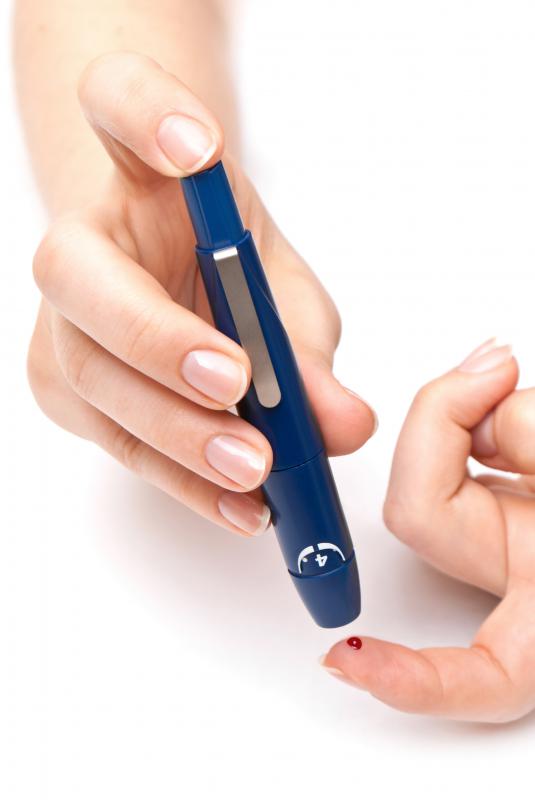At TheHealthBoard, we're committed to delivering accurate, trustworthy information. Our expert-authored content is rigorously fact-checked and sourced from credible authorities. Discover how we uphold the highest standards in providing you with reliable knowledge.
What is Serum Glucose?
Serum glucose, also known as blood sugar, is the amount of glucose or sugar present in the blood. Its measurement is often done to establish the diagnosis of diabetes mellitus. Regular monitoring of serum glucose is also vital in the management and treatment of individuals with diabetes.
Glucose in the blood mostly comes from food sources, such as carbohydrates. Carbohydrates in the diet are generally broken down into smaller structures called glucose, which are then distributed throughout the body through the blood to be used as energy by cells. As the blood sugar increases, the pancreas releases the production of insulin. Insulin is an important hormone which regulates the uptake of glucose in cells throughout the body. When insulin is low, such as in cases of diabetes and pancreatic cancer, glucose is not taken up by the cells, and its concentration remains persistently high in the blood.

The usual procedure to test for serum glucose is to perform a fasting blood glucose test. Patients are instructed to fast overnight, that is to eat no food for at least eight hours. Normally, the concentration of glucose in the blood is 100 mg/dL. A fasting blood glucose between 100 mg/dL and 126 mg/dL is said to put an individual at a prediabetes stage. Dietary precautions and lifestyle changes are often encouraged for individuals with blood sugar within this range, in order to halt the development of diabetes.

A high serum glucose or hyperglycemia, usually 126 mg/dL and above, is often an indication of diabetes. Other conditions where serum glucose are also elevated include pancreatitis, Cushing syndrome, and chronic renal failure. Too much food and drink rich in sugar may also cause a temporary increase in blood glucose levels. Medications, like corticosteroids and antidepressants, are among the many types of drugs which can also lead to hyperglycemia. Symptoms associated with hyperglycemia include increased thirst, frequent urination, and blurred vision.

Hypoglycemia, or a low concentration of glucose in the blood, usually below 70 mg/dL, can also occur. It is mostly seen in conditions like hypothyroidism and insulinoma, a rare tumor in the pancreas which secretes insulin in large amounts. Symptoms of hypoglycemia include confusion, dizziness, fatigue, and in severe cases, seizures and coma.
Management of high serum glucose, such as that seen in diabetes cases, often includes lifestyle changes including regular exercise, eating healthy meals, and avoiding foods which can increase the concentration of sugar in the blood. Proper compliance with daily medications is greatly encouraged. Testing of blood glucose is also done regularly to monitor the patient's response to treatment.
AS FEATURED ON:
AS FEATURED ON:















Discussion Comments
Because of dietary issues which affect serum glucose, I have known of some doctors to tell patients to watch their diet and then return for a second glucose blood test if their levels are on the cusp of being indicative of diabetes, just to make sure it is not just because of the foods they eat.
I have a friend who was living overseas and needed a lipid panel to check her cholesterol and blood pressure levels. She fasted, had the test, and got the results from her supervisor later- who had accompanied her to the doctor- and was told, "your sugar is fine".
She had to get a new doctor and be tested again for the right things. When talking a new doctor, no matter where you are, make sure they understand what tests you need.
Post your comments